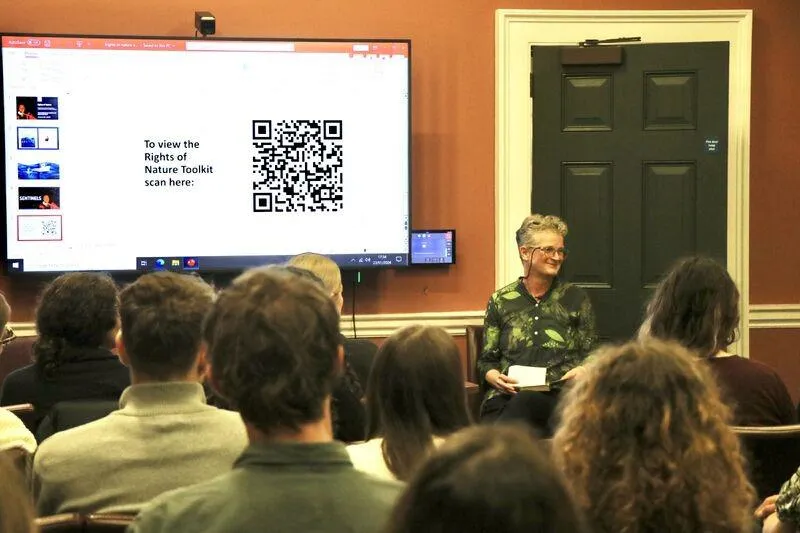Rights of Nature is more about a philosophical shift in which we value nature for its intrinsic value, rather than for how it can help us to create profit. It’s a bit like animal rights in that way – viewing animals as morally important just because they are alive. What’s different about our toolkit from a textbook is that we are open about our philosophical bias. We don’t really have rights of nature laws in the UK per se. But one could argue that criminal prosecutions against individuals/companies that pollute the environment is a way of protecting the rights of nature and rights of rivers not to be polluted.
Maya Pardo, PGDip Law and Professional Practice 2024, King's College London
16 February 2024
King's students launch Rights of Nature Toolkit
The King’s Legal Clinic launched a legal blueprint in January, titled 'Rights of Nature Toolkit: How to protect Rivers in England and Wales’ for protecting the environment from a Rights of Nature perspective.

Environmental activists and community groups have welcomed the King’s Legal Clinic 'Rights of Nature Toolkit: How to Protect Rivers in England and Wales’. Initiated as part of a King’s Undergraduate Research Fellowship (KURF), it was officially launched in January, and has already been viewed over 74,000 times on X (Twitter).
As well as advancing the concept of Rights of Nature as a legal outlook, it is intended as a practical guide for diverse stakeholders from campaigners to law students, who work within legal and environmental advocacy. At its heart is an ambition to promote the rights of rivers, including the right to be free from pollution. The toolkit actively promotes access to justice, by attempting to de-mystify laws regulating water pollution and providing practical advice on how to use legal tools to protect rivers. As an emerging area of law there is relatively little literature on applied rights of nature approaches, and this is the first such guide covering rivers in the UK.
As a legal framework, rights of nature elevates the natural world to have the same legal standing as humans, and rejects an anthropocentric approach, which can often monetise nature. As a movement, it is gaining traction across jurisdictions from Latin America to Asia to remedy environmental and ecological damage.
The toolkit also mentions the right to a healthy environment, which could also provide an alternative legal pathway to protect rivers and other environmental sites in the UK. There are twenty-nine countries which have made provisions for rights of nature and currently 156 countries have recognised the right to a healthy environment. Currently the UK hasn’t implemented or recognised either.
Since privatisation of the water industry took place in the UK in 1989, the UK water sector is one of the most heavily regulated areas of the environment and sectors in the world. Despite this, there are still alarming figures which raise concern and demands the case for greater action.
According to the campaign group ‘Surfers against Sewage’ 26,568 sewage pollution alerts were sent to their Safer Seas and Rivers Service App in 2023 alone. This is hardly surprising since, as noted by the Office of Environmental Protection, just 16% of rivers in England and Wales warrant ‘good’ ecological status.
The toolkit was started by former King’s students Amanda Ignatia and Freya Skyrme, and Maya Pardo took up the challenge revising and completing it. She recently graduated from the PGDip in Law and Professional Practice program. Sue Willman, Lecturer and Acting Director of Clinical Legal Education and Supervising Solicitor, supported and supervised this work. British academic and well-known nature writer Robert Macfarlane, who attended the launch, remarked that that “the document is amazing. So thorough, imaginative and substantial.”

The toolkit serves as a fully comprehensive guide with sections on:
- Gathering information and make information requests
- Submitting a complaint as well as criminal prosecutions
- Judicial review
- Environmental planning law
- Nuisance claims
- Human rights claims
- Soft-law transnational complaints
- Public participation including council motions
- Public consultations
- Objecting to planning permission
The Toolkit was collaboratively produced and sought consultation from other environmental organisations and Non-Governmental Organisations, including London Waterkeeper who strategically work to protect rivers. Theo Thomas, the chief executive of London Waterkeeper, also spoke at the launch event for the toolkit.
Together we are writing a new narrative with and not for Nature. We want tales that inspire, nurture, and provide solace. At the same time, we need robust tactics so everyone can hear Nature’s voice. The ‘Rights of Nature Toolkit: How to Protect Rivers in England and Wales’ is a new chapter in this story. It will help those that care navigate the complex legal landscape and hold the system to account.”
Theo Thomas, Chief Executive, London Waterkeeper
Although the Toolkit is an environmental guide intended for English rivers and environment, King’s Legal Clinic also hopes that it can be used as a guide for other jurisdictions, especially in the Global South where many of the battle grounds for rights of nature are being drawn.
You can read the toolkit on the Legal Clinic's web pages.

